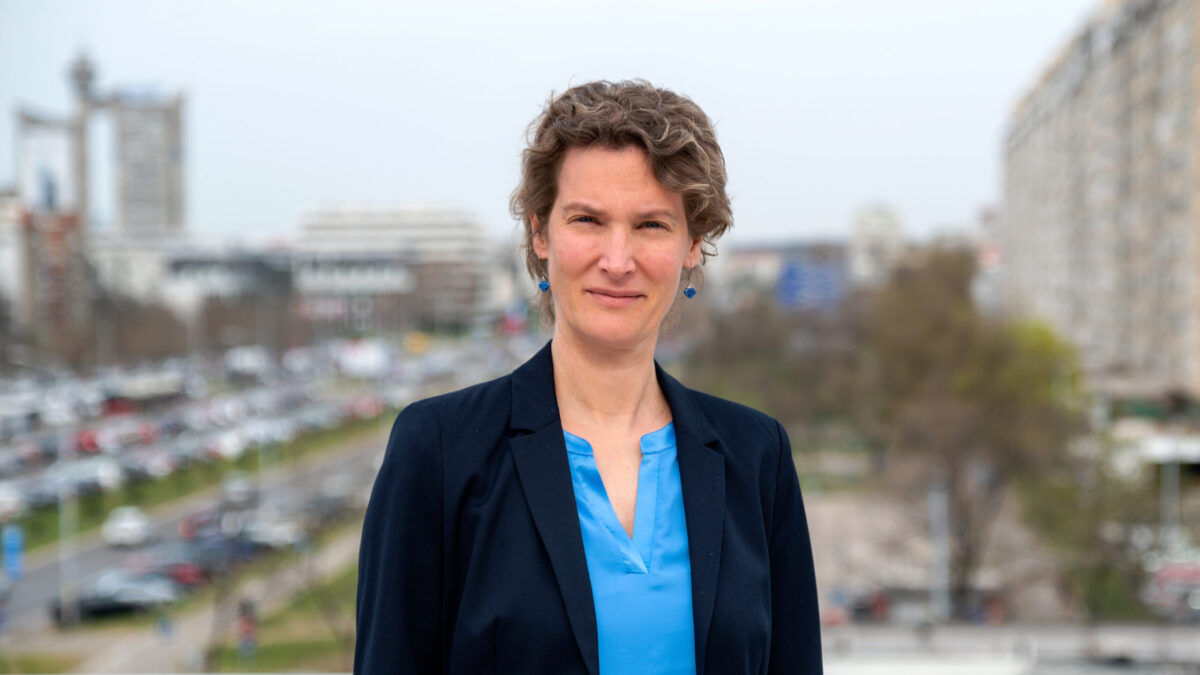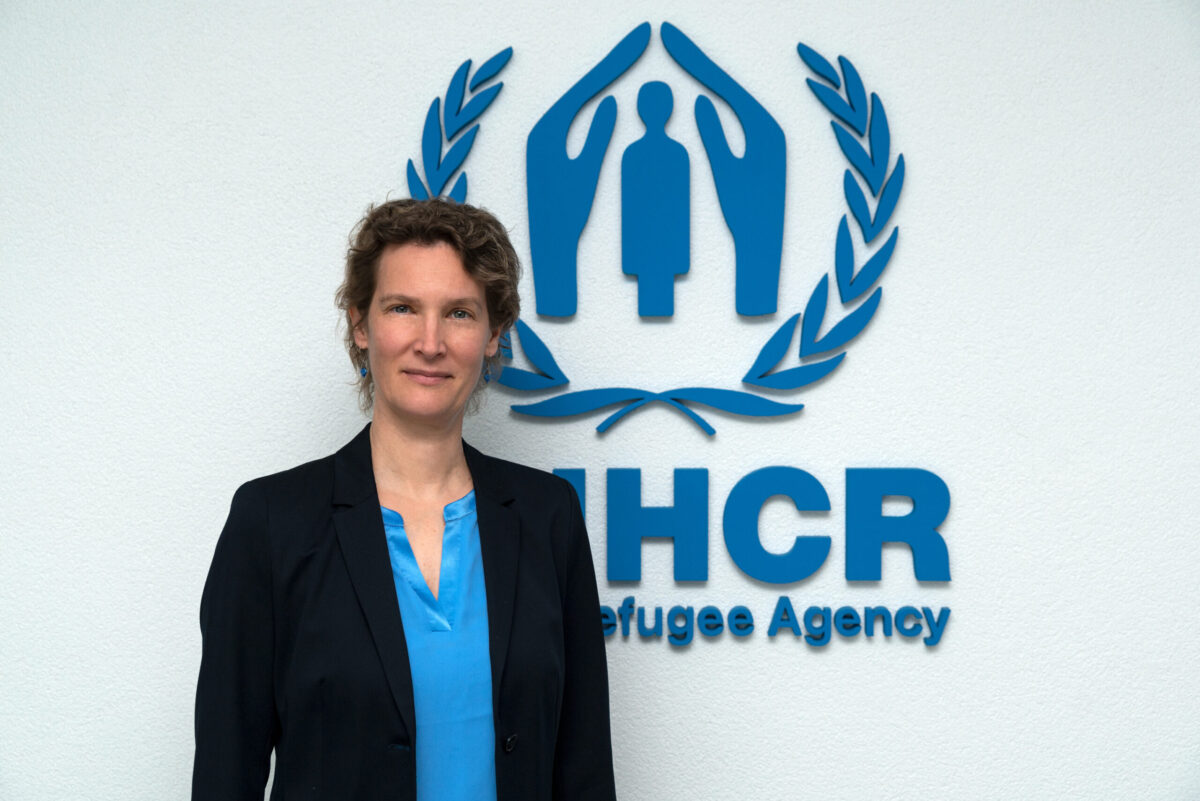UNHCR works closely with all stakeholders on the ground to provide immediate relief to those fleeing war, mainly women and children
Every few years the world is hit by a major refugee crisis: in 2015 and onwards, it was the Middle East refugee crisis, then the crisis followed, together with the Venezuelan migrant crisis and various natural disasters like the one in Madagascar. At the beginning of 2022, one of the biggest European countries was hit by war, triggering millions of refugees once again. We are discussing the newest events with Stefanie Krause, the Deputy Representative UNHCR in Serbia.

The situation with the refugees in 2022 is even worse than in 2015 when there were close to 1.5 million refugees. This year, almost 4 million Ukrainians were forced to leave their homes. What is UNHCR doing to alleviate the hardships of such a staggering number of people?
The sad reality is that the number is even higher, more than 10 million people have been displaced by the military hostilities in Ukraine, 6.5 million persons inside Ukraine and more than 4 million refugees have sought refuge in neighbouring countries. These displaced persons add to the number of 84 million forcibly displaced persons globally, of which 26.6 are refugees. This is the highest number ever displaced persons worldwide.
UNHCR, the UN Refugee Agency, responds to the needs of internally displaced persons in Ukraine and the refugees in Hungary, the Republic of Moldova, Poland, Romania, and Slovakia. In Ukraine, we operate within the inter-agency humanitarian response. We focus our efforts on the areas of protection, shelter and cash and in-kind assistance, in order to provide immediate relief to those fleeing. Within this response, through the cash assistance for immediate needs, 360,000 persons are targeted, and 550,000 relief items are planned to be distributed. To date, 65,500 people have benefitted from core relief items and food assistance. More than 11,860 have received shelter assistance.UNHCR teams and our local NGO partners are present at border points, in transit and reception centres providing information, counselling and support. We have also reached out to areas directly affected by the bombardment to provide immediate protection and core relief items. We are providing humanitarian assistance wherever necessary and possible. We have stockpiles prepositioned in various locations in the region and we stand ready to send more staff and supplies.
Poland is the most affected country in terms of the number of refugees the country took in, but in terms of percentage, Moldova took the highest number of refugees per capita despite being the poorest European country. What has UNCHR been doing to help Moldova?
UNHCR has offices in Poland, Romania, Hungary, Slovakia, Slovenia and the Czech Republic under a multi-country office in Budapest. We have a longstanding presence in the region, working with national authorities on refugee-related matters. In Moldova, UNHCR has immediately increased its presence to establish the emergency response to support the government receiving the refugees. UNHCR maintains a presence at border crossing points, accommodation, and transportation hubs around the country. Through UNHCR and partners, 105 reception centers have received support.
“UNHCR, the UN Refugee Agency, responds to the needs of internally displaced persons in Ukraine and the refugees in Hungary, Republic of Moldova, Poland, Romania, and Slovakia. In Ukraine, we operate within the inter-agency humanitarian response”
UNHCR welcomes the pledges by the EU Member States and the other European States to transfer refugees from Moldova to their territory under the auspices of the EU Solidarity Platform. UNHCR is identifying vulnerable persons in Moldova and working with IOM, the European Commission and the other EU Member States to facilitate more transfers from Moldova to the EU. UNHCR is also informing refugees on what to expect in the receiving countries, including reception capacity and overall conditions so they can make informed decisions about the trip.
In Moldova, an Inter-Agency Coordination Group has been established with more than 100 participating members. The Government of Moldova has established a Single Emergency Management Centre under the Prime Minister’s Officer, where UNHCR represents the Inter-Agency Coordination Group, ensuring coordination between the two.
How much the fact that 90% of these refugees are women and children helps or aggravates the situation?
The majority – more than 90% – of refugees fleeing Ukraine are women and children. This presents particular protection risks. Women and girls are at a heightened risk of gender-based violence in situations of mass displacement, and more vulnerable to risks of exploitation and abuse, including trafficking. To reduce these risks, UNHCR has initiated a ‘stay safe campaign’ to raise awareness among persons fleeing Ukraine about the risks and practical measures to mitigate these.
UNHCR and UNICEF are jointly rolling out ‘Blue Dots’ in the Czech Republic, Hungary, the Republic of Moldova, Poland, Romania and Slovakia. The Blue Dots are one-stop-shops and safe spaces that provide a minimum set of protection services for children, families, and others with specific needs, in support of existing services and government efforts. This concept was originally developed in 2016 for the Western Balkan route.
An essential aspect will be to include the Ukrainianrefugee children as soon as possible in the education systems and to provide social services for the single parents and caregivers, who are mostly mothers and grandmothers.
The perception of the Ukrainian refugees is much better compared to the Middle Eastern refugees. What can be done for the Middle Easterners to get more equal treatment?
UNHCR has consistently been advocating for access to asylum for all refugees regardless of the country of origin. Respecting human rights and refugee rights is not a choice – it is to abide by international law and should never be based on nationality or way of arrival.
Neighboring countries of those affected by conflict and displacement have welcomed refugees for decades in large numbers, saving millions of lives. 73 per cent of refugees and Venezuelans displaced abroad lived in countries neighboring their countries of origin and developing countries host 85 per cent of the world’s refugees. Countries neighboring Syria including Turkey, Lebanon, Jordan and Iraq have hosted 5.7 million Syrian refugees for over a decade; Kenya and other countries across the African continent continue to provide protection to Somalis; Bangladesh hosts hundreds of thousands of Rohingyas, Colombia is host to more than 1.7 million Venezuelans. Therefore, it is critical that European countries in the immediate vicinity of Ukraine accept them and provide international protection.
We have been deeply concerned about rising xenophobia, discrimination and exclusion against refugees and asylum seekers in recent years, so we welcome this tremendous reception and solidarity towards refugees in recent days. I hope this inspires greater solidarity with all persons who need to flee their homes to save their lives.

Could any experiences gained during the refugee crisis in 2015 be applied to the current situation? What are the similarities and differences between these two emergency situations?
As more people flee violence and insecurity, the number of forcibly displaced exceeded 84 million globally without taking into account Ukrainian refugees and internally displaced persons.35 million (42%) of the world’s forcibly displaced persons are children, and by now, 1 million children have been born as refugees. This is the bigger picture in which both the refugee flow to Europe in 2015 and now the displacement from Ukraine is situated.
I would like to highlight the importance of all actors working together to support and find solutions for refugees. In this regard, the Global Compact on Refugees from 2018 is a framework for more predictable and equitable responsibility-sharing, recognizing that a sustainable solution to refugee situations cannot be achieved without international cooperation. It provides a blueprint for governments, international organizations, and other stakeholders to ensure that host communities get the support they need and that refugees can lead productive lives. It constitutes a unique opportunity to transform the way the world responds to refugee situations, benefiting both refugees and the communities that host them.
“UNHCR has consistently been advocating for access to asylum for all refugees regardless of the country of origin”
The lesson learned is that we all need to work together, and the EU’s, as well as Serbia’s, decision to apply the Temporary Protection Directive for Ukrainian refugees, is particularly commendable as it ensures refugees are admitted swiftly to the territory, receive protected status and have access to rights including education, health and access to the labor market. UNHCR stands ready to support the authorities in the implementation of the Temporary Protection decision, as well as with any other relevant backings within the scope of our work and mandate.
Serbia was a safe haven for many refugees from 2015 onwards. What are your experiences with the Serbian government and NGOs?
UNHCR has a longstanding presence in Serbia since 1976 and during 46 years of our work here we have nourished a fruitful partnership with Serbian authorities aimed at providing better living conditions and durable solutions for people forced to flee or those who are at risk of statelessness.
We remain committed to continuing to support the authorities and working with the civil society for the further advancement of the asylum system, supporting vulnerable persons in displacement, and expanding opportunities for inclusion and integration of persons granted international protection in Serbia. We continue to support the Regional Housing Programme completion for the most vulnerable refugees from the region, advocating for the rights of internally displaced persons and finding solutions, and reducing the risk of statelessness.
We are living in the world of displaced people and the Ukrainian situation is almost an unprecedented situation except for the two world wars. Does UNHCR need more funding to deal with this problem?
The number of displaced persons is higher than ever. With these increased figures, the need for protection, assistance and solutions increases and therefore the need for financial resources. UNHCR’s global budget requirements to address the needs of forcibly displaced persons are over 10Bln in 2022, out of which only 19% are currently funded. In response to the displacement from Ukraine, UNHCR launched its Supplementary Appeal for the Ukraine situation, seeking an initial $510 million. This includes $270 million as part of the UN Flash Appeal for the response within Ukraine for a three-month period and $240 million as part of the regional refugee response plan in neighboring countries for a six-month period.
“Whereas financial means are indispensable, acceptance of refugees by local communities is equally important as this enables them to contribute immensely to new societies with their fullest potential”
UNHCR works in partnership with governments, civil society, the private sector, academia, media, refugees and the local communities and it is of utmost importance that the national systems have sufficient capacities to include refugees. Access to affordable housing, education, healthcare, and the labor market is important to include refugees in societies that host them. Whereas financial means are indispensable, welcoming and acceptance of refugees by local communities and providing an opportunity for refugees to use the human capital which they bring, their skills and qualifications, is equally important.